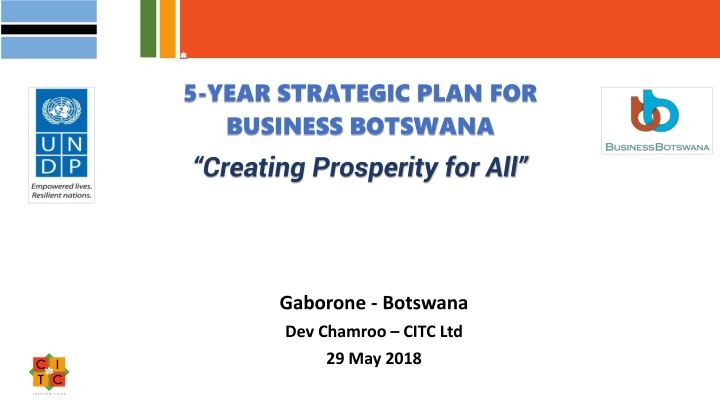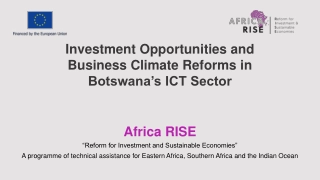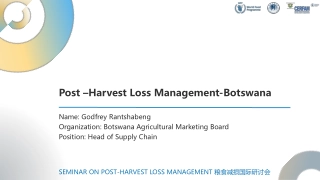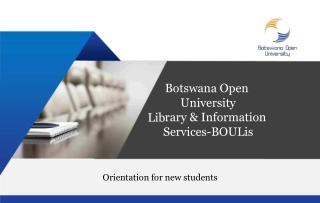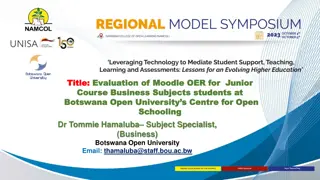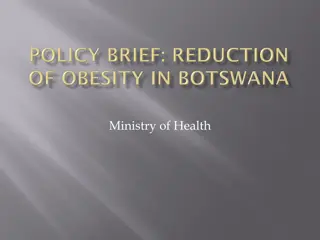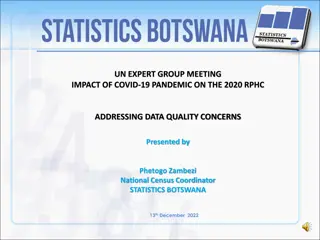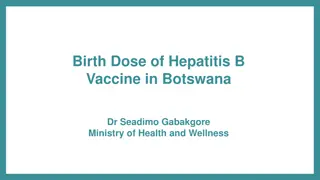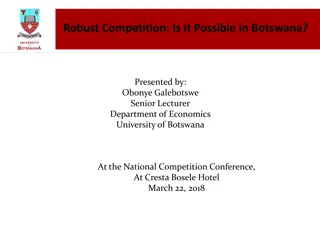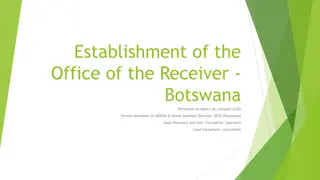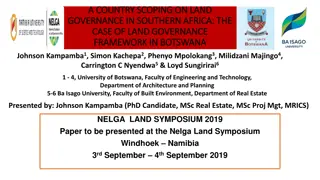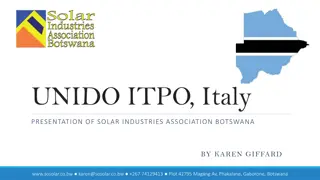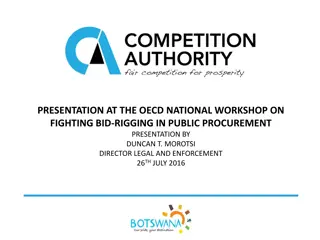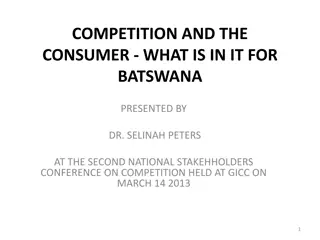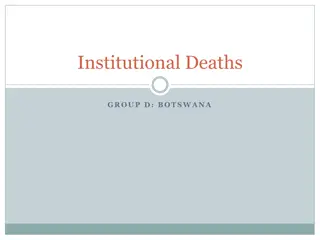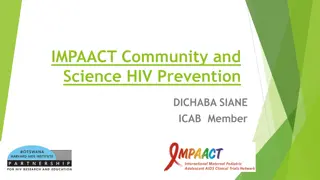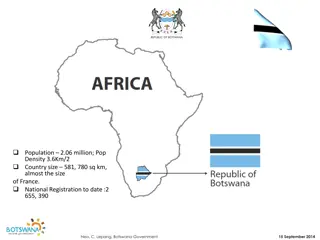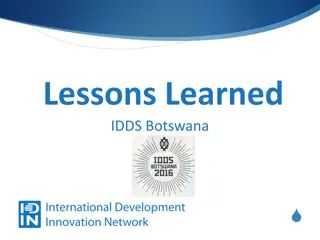Strategic Analysis of Business Botswana: Towards Sustainable Growth and Development
Conducting a comprehensive review of Business Botswana reveals internal strengths such as governance structure, while weaknesses include financial constraints and leadership issues. The organization aims to enhance visibility and attract more support for its endeavors, focusing on policy advocacy and international outreach to strengthen its impact.
Download Presentation

Please find below an Image/Link to download the presentation.
The content on the website is provided AS IS for your information and personal use only. It may not be sold, licensed, or shared on other websites without obtaining consent from the author.If you encounter any issues during the download, it is possible that the publisher has removed the file from their server.
You are allowed to download the files provided on this website for personal or commercial use, subject to the condition that they are used lawfully. All files are the property of their respective owners.
The content on the website is provided AS IS for your information and personal use only. It may not be sold, licensed, or shared on other websites without obtaining consent from the author.
E N D
Presentation Transcript
5-YEAR STRATEGIC PLAN FOR BUSINESS BOTSWANA Creating Prosperity for All Gaborone - Botswana Dev Chamroo CITC Ltd 29 May 2018
Coming together is a beginning; National National Validation Validation Workshop Workshop Keeping together is progress; Working together is success
Business Botswana: At Crossroads Business Botswana: At Crossroads Metamorphosis Metamorphosis From From BOCCIM BOCCIM Voice of Business Voice of Business Business as usual Business as usual Members challenges Members challenges Talk Talk- -Talk Talk To To Business Business Botswana Botswana Make it Happen Make it Happen Think outside the Box Think outside the Box Economic Development Challenge Economic Development Challenge Walk the Talk Walk the Talk RETHINKING THE APEX BODY MODEL RETHINKING THE APEX BODY MODEL
Private Sector in the Rear Private Sector in the Rear- -Mirror Mirror 2017 xxx +30% xxx 9.1% 47.7% xxx Number of Companies Companies operating in the informal Contribution to GDP Contribution to Export Contribution to jobs creation Value addition by private sector LEAP LEAP FROGING FROGING
Economy in Rear Mirror Economy in Rear Mirror 2017 GDP in real-Term USD 18.19b GDP Per Capital USD 7,543 GDP Per capita PPP USD 18,863 GDP growth 4.9% Total Exports USD 5.127b FDI USD 679m (2016) USD 10M (2016) USD 583m (outflow)
Contribution to GDP Economy in Economy in Rear Mirror Rear Mirror 35% 62% 3% Services Agriculture Industry
Business Botswana Business Botswana SWOT SWOT INTERNAL FACTORS STRENGTHS (+) WEAKNESSES (-) Governance issues Weak Financial situation Limited Human Resource capabilities Weak Value proposition Member attribution Weak leadership (no strategic guidance) Declining staff s morale and motivation Unclear process & procedures A poor documentation of achievements Clash of governance roles & responsibilities Inability to present a simple and consistent message about why it exists Low visibility-absence of a communication strategy Inability to attract adequate financial support for its work Absence of a proper M & E framework Low international footprint Respected Policy Advocacy role Good physical infrastructure and location Dedicated staff members Goodwill, good relationship with Government Only recognized employer organization & Chamber of Commerce Valuable Resources: in terms of human & assets Qualified professionals with strong experience, knowledge on the ground National geographical coverage Multi-sectoral membership An established forum for working with government to improve the business environment The champion for a thriving business environment (represents all sectors) Recognized by Government as the sole voice of business
Business Botswana Business Botswana - - SWOT ( SWOT (Ctd Ctd) ) EXTERNAL FACTORS OPPORTUNITIES (+) THREATS (-) New Opportunities under NDP-11 Potential funding from government Collaborative Partnerships Improved government regulations Growth of Membership, multi-sectoral and multi-disciplinary Change in Presidency: as VP friendly towards investors/expected relaxation of permits regime Secretariat as SPSF, being recognized at regional level Mandatory membership Understanding and appreciation of BB s role by the public New organization and governance structures Goodwill by sponsors (finances + technical) Government s willingness to consult the private sector on business regulations New attributes and services e.g attracting FDI and export promotion, promoting PPP Improvement /enhancing of Botswana s Ease of Doing Business index and other international indices Proliferation of Associations and Chambers of Commerce and Industry Loss of members Financial worries Loss of Relevance Collapse of the structure of dialogue with Government (HLCC, SLCC, & LLCC) Exorbitant cost of accreditation with BQA for training courses Poor public perception of BB role in the business environment Loss of goodwill by government and members Establishment of sectoral associations with similar objectives Lack of common effort to demonstrate the membership benefits Slow diversification (leads to slow economic growth)
Situation Analysis: PESTLE Situation Analysis: PESTLE Political Economic Social Technological Legal Environmental
Expectations Expectations Matrix: Matrix: BB to play a catalytic role in the economic transformation of Botswana as the engine of growth to promote sustained, inclusive, balanced and sustainable development Strong and unfailing support from the Government and its public-sector agencies Receptive to propositions on improving the business climate of Botswana Timely implementation of policies and decisions Investor/Investment Protection Some form of financial support Government Government
Expectations Expectations Matrix: Matrix: 1.BB to play a more aggressive and proactive role in representing the members interests 2. To provide value- adding support services 3. To promote the Brand Image of BB and its members 1.Active participation and contributions 2. Payment of dues on time 3. Members to take leadership role in their respective industry and community 4. To uphold high levels of good governance, responsible and ethical business practices Members Members
Expectations Expectations Matrix: Matrix: BB to act as the Voice of all businesses in Botswana and to provide efficient advisory and support services to promote the cause of business in general Non-members to become fee paying member of BB Non Non- -Members Members
Expectations Expectations Matrix: Matrix: Better coordination and cooperation on policy issues Support and collaborative partnership: valuable contributions and proposals Civil Civil- -Society Society
Challenges Identified during Challenges Identified during the Consultation Process the Consultation Process Predominance of the public sector Small domestic market (+2 million + tourists) Diamond is King (Slow diversification) Difficult business climate (Heavy bureaucracy & Red Tape) Overdependence on the public sector Inward looking economy Rigid labour market Skills mismatch Access to Finance Inadequate Infrastructure
Challenges ( Challenges (contd contd) ) Technology absorption & Innovation & Obsolescence Fear of Failure Absence of policy coherence and Institutional alignment Competition from regional & international players Products/Services not competitive enough MSMEs in infancy (formal v/s informal sectors) Lack of appropriate industrial infrastructure for MSMEs Overcentralisation of public decision process Quality standards of products need upgrade Land-locked economy High cost of doing business
Challenges ( Challenges ( contd contd) ) Poor Work ethics Low productivity Aggressive industrial relation Absence of accountability of the public service Unfair Competition Interpretation of laws and regulations Misalignment between central and local governments Treatment of foreign investment and investors & expatriates Corruption
International Challenges International Challenges Fast Globalization Economic uncertainty (crisis, end of preferences..) Terrorism Growth of Protectionism Digitalization Climate Change Standards and Norms Gender Equality & Women Empowerment
Regional/ National Industry/sector Enterprise Entrepreneur International Protectionism Mushrooming of Regional Integration Institutions Legal, Regulatory & Institutional framework Infrastructure- External shocks Prominence of Mining sector (Diamond) Low diversification/ Cluster development Human capital & Skills development Competitiveness Compliance to standards & Norms R&D Innovation Industrial Relation Product development Export readiness Access to Finance Marketing & Commission Trade Negotiations Private Sector: Private Sector: Hierarchy of Constraints Hierarchy of Constraints
Key Recommandations: Short Term Key Recommandations: Short Term Actions Actions Address Bureaucracy and Red tape Improve Poor work ethics and aggressive employment relations Clarity and predictability of legal and regulatory frameworks Promote Inclusive and sustainable growth Promote fair Competition Promote research, development and innovation, technology transfer Improve the processing of Work and residence permits Introduce investor aftercare programme Facilitate access to finance and credit Small domestic market building export readiness Build policy coherence and institutional alignment Improve processes for Resistance and Work permits to foreign investors Promote Local Enterprise Development scheme (industries reserved for citizens) Make Licensing for business and not for premises Inward looking enterprises Export-oriented enterprises Strengthen entrepreneurship development framework Build institutional capacity (BB) Improve revenue stream for BB Improve compliance to quality standards and norms
Key Key Recommendations Recommendations: Long : Long Term Term Actions Actions Enabling business climate/ higher Ease of Doing ranking Fight against Corruption Promote sustainable, balanced and inclusive growth Robust diversification and cluster development programmes Improve accountability of the public sector Improve Competitiveness & Productivity Reduce the dominance of the public sector in the economic life of Botswana Lower costs of doing business Strong trade facilitation Build efficient infrastructure Open and friendly environment to FDI Strong pro-MSME policies Capacity building of civil service and trade support institution to deliver quality services Build harmonious work and industrial relations Address the rigid labour market Strengthen private sector development programmes Reduce dominance of the informal sector Address skills mismatch Promote regional integration to access its benefits
Handing Over Capacity Building Validation Strategy Consultation Review & Analysis Strategy Development Methodology Strategy Development Methodology Co Co- -Creation Creation
Strategic Thrusts Strategic Objectives Strategic Actions Expected Outcomes Business Botswana Business Botswana 5 5- -Year Strategy Methodology Year Strategy Methodology
Business Botswana Business Botswana Mission Vision To serve as the unified voice of business striving to enhance business environment, the vitality and competitiveness of private sector in Botswana To be the foremost business organisation driving sustainable economic development and social transformation of Botswana Professionalism & Integrity Excellence & Result oriented Core Values (BB) Good Governance & Accountability Continuous learning & Innovation Collaborative & Consultative We Make it Happen We Make it Happen
Critical Constraints/Gaps Critical Constraints/Gaps Legal & Regulations challenges Programmatic Challenges BB: Most Creative, Innovative & Passionate organisation Institutional Leadership challenges
Programmatic challenges Legal & Regulatory challenges Access to resources (land, finance, technology, infrastructure) Operating a Business (factors of production) Linking to market (quality, quantity, price, logistics) Fair competition (Procurement, Protection, competition policy, International trade agreement) Industrial Peace & Harmony Legal & Regulating & Administrative framework Business registration & licensing Taxation Institutional leadership challenges Institutional alignment Collaborative partnership Challenges Challenges
Public Sector Strategic Approach to Private Sector Private Sector approach to Business Poverty alleviation Maximize Opportunities Promoting sustainable & Inclusive development & growth Protection Clear, transparent, equitable, easily accessible, predictable and rule-base legal, regulatory& administration framework Promote social stability Industrial Peace & Harmony Public Public Private Sector: Expectation Private Sector: Expectation Dilemma Dilemma
Transparency & Good Governance Participation in Community Affairs Promoting industrial peace & harmony Ethical Business Practices Promoting inclusive & sustainable Promoting geographically balanced dual Promoting Economic Diversification Profits & Growth Private Sector Engagement Matrix in Private Sector Engagement Matrix in Economic Development Economic Development
Strategic Strategic Thrusts of BB of BB Thrusts
Making Business Happen through policy advocacy & Lobbying: THE ENABLER ( to do on behalf of) Strategic Thrust 1 Building Competitiveness of private sector: THE BUILDER ( to do for/to) Strategic Thrust 2 Engaging business in national economic development: THE EMPOWERER ( to do with/make them do) Strategic Thrust 3 Making BB a more efficient and effective organisation: THE DOER Strategic Thrust 4 Strategic Thrusts to Achieving Vision Strategic Thrusts to Achieving Vision and Mission and Mission
Strategic Strategic Objectives of BB Objectives of BB
Objectives 1.1 To become the voice of the private sector for effective policy advocacy and lobbying 1.2 To enhance the clarity and predictability of business laws and regulations and the screening and authorization process 1.3 To co-create an enabling business environment that fosters integrated and constant development of the private sector in Botswana 1.4 To build smart and sustainable collaborative partnership with key public and private sector stakeholders to ensure speedy implementation of policy Outlook for 2023 1.Botswana has a clear, transparent, equitable, predictable and rule base framework for doing business 2.Improved ranking in international indices and survey reports ST1: Making ST1: Making Things Things Happen Happen through Policy through Policy Advocacy & Advocacy & Lobbying Lobbying
Objectives 2.1 To promote industrial upgrading and Modernisation of local industry, research & development, and innovation & technology transfer 2.2 To continuously build the capacity of local businesses to compete and win at the national, regional and international levels 2.3 To foster industrial peace and harmony by setting appropriate platforms for collaborations, dispute resolution, negotiations, mediation and arbitration 2.4 To accelerate economic diversification and cluster development 2.5 To promote networking, business linkages and business matchmaking to stimulate joint ventures, sub-contracting, licensing, franchising, and mergers & acquisitions Outlook for 2023 1.Increasing number of Botswana enterprises who are successfully competing in the regional and international markets 2.The contribution of non-diamond sector to GDP exceeds 50% 3. BB to have its own Centre of Excellence 4. BB to host an Arbitration Centre ST2: ST2: Building the Building the competitiveness competitiveness of the Private of the Private sector through sector through structured structured support services support services
Objectives 3.1 To create ecosystems for good governance, transparency and ethical business conduct by BB members 3.2 To promote sustainable and inclusive growth and development 3.3 To engage more business in the community through structured Corporate Social Responsibility (CSR) 3.4 To promote geographically balanced development of Botswana 3.5 To accelerate the transformation of informal business onto the formal sector 3.6 To enhance support to local enterprise, with specific focus on Micro, Small and Medium enterprises (MSMEs) Outlook for 2023 1.Botswana s business voluntarily adopt codes of ethical business, good governance, sustainable development, CSR, to promote sustainable and inclusive growth and are engaged in their community 2. A vibrant and robust formal sector ST3. Engaging ST3. Engaging Business in Business in sustainable and sustainable and inclusive inclusive development development and growth and growth
Objectives 4.1 To make Business Botswana a learning organization with effective processes and speed of intervention 4.2 To build a united, capable, enthusiastic and pro-business Team willing to do the extra lap 4.3 To improve resource efficiency and financial viability of BB 4.4 To improve the quality and diversity of services to meet and exceed stakeholders expectations 4.5 To improve the Brand image and visibility of Business Botswana 4.6 To develop and reinforce strategic partnerships at the local, regional and international levels 4.7 To strengthen membership through retention and recruitment initiative 4.8 To re-engineer the organisational and governance structures 4.9 To make BB a responsible, transparent and accountable organization to walk the talk Outlook for 2023 Business Botswana is a strong multi-sectoral and multi- regional model apex body for peer organizations to emulate ST4: Making ST4: Making Business Business Botswana a Botswana a more effective more effective and efficient and efficient organization organization
Actions Actions Strategic Thrust 1: Strategic Thrust 1: Making Things Happen Making Things Happen Through Policy Through Policy Advocacy and Lobbying Advocacy and Lobbying
ACTIONS ACTIONS 1.1.1. To fine tune the existing dialogue framework with government and authorities (w.r.t LLCC, SLCC and HLCC) 1.1.2. To coordinate the business community s consultation with the Head of State and his Ministers 1.1.3. To establish an online platform for members to post problems and difficulties in obtaining licenses, permits, clearances and approvals 1.1.4. To lobby government for affirmative policy mix to endow Botswana with conducive business environment 1.1.5. To participate in high level economic diplomacy and international cooperation (AGOA, SA-EU EPA, WTO, SADC, EAC-COMESA-SADC Tripartite, Continental Free Trade Area) as part of government negotiating team with possible funding from the State 1.1.6. To advocate for equal and national treatment to foreign investors and investments 1.1.7. To provide timely policy inputs on issues of national importance 1.1.8. To engage with the Ministry of Finance on pre-Budget consultations 1.1 To become the voice of the private sector for effective policy advocacy and lobbying
ACTIONS ACTIONS 1.2.1 To devise a checklist of good practices to enhance the approval processes at local authorities, institutional and ministry levels ( No of licences, permits, approvals & clearances) 1.2.2 To co-create guidelines for the approval process which should be clear, transparent, equitable, easily accessible and rule- based (process, time and cost) 1.2.3 To disseminate the regulations and administrative notes among members and the private sector in general 1.2.4 To work closely with the government to ensure that private sector enterprises are offered equal treatment to State Own Enterprises as per national laws (no exemption, no equal than equals and no favourable treatment) 1.2.5 To clearly define and disseminate the list of priority sectors reserved for local enterprises. 1.2.6 To work with government to establish clear and predictable policies and criteria for access to land for business purposes 1.2.7 To work with government to improve the processing and approval for issue and renewal of visas, work and resident permits for foreign investors, investor family and for expatriate workers 1.2 To enhance the clarity and predictability of business laws and regulations and the screening and authorization process
ACTIONS ACTIONS 1.3.1 To conduct regulatory impact assessment of existing and/or new regulations and policies which will have significant impact on business 1.3.2 To propose evidence-based amendments and enactments and policy changes to remove impediments and bottlenecks that are asphyxiating the business from happening (to use the World Bank Ease of Doing Business Framework) 1.3.3 To propose E-Governance initiative for submission, processing and approval of licenses, permits, approvals and clearances, similar to E-filing of taxes and Single window initiative for customs clearances 1.3.4 To propose the setting up of an E-Judiciary for faster hearing and closure of business cases 1.3.5 To identify infrastructure priorities for trade and investment and mainstreaming them in national development agenda 1.3.6 To help improve the public-private-partnership framework and advocate for the setting of a capacitated PPP unit at the Ministry of Finance and at key ministries 1.3.7 To collaborate with public sector agencies to improve the ranking of Botswana in international indices and surveys 1.3 To co-create an enabling business environment that fosters integrated and constant development of the private sector in Botswana
ACTIONS ACTIONS 1.4.1 To identify stakeholders who play a relevant role in policy making, public administration and project implementation 1.4.2 To develop meaningful partnerships with key agencies, departments and agencies, in the style of Memorandum of Understanding (MoU) for information exchange and collaboration 1.4.3 To establish Focal Points (with Alternates) in each identified institution 1.4.4 To establish a multi stakeholder forum where key stakeholders can engage in systematic on business related discussions and propose solution to any problem areas 1.4.5 BB to provide Secretariat services and to ensure appropriate follow up actions on deliverables 1.4 To build smart and sustainable collaborative partnership with key public and private sector stakeholders to ensure speedy implementation of policy
Actions Actions Strategic Thrust 2: Strategic Thrust 2: Building the Building the competitiveness of competitiveness of private sector through private sector through structured support structured support services services
ACTIONS 2.1.1 To conduct a survey on the supply side capabilities of BB members (managerial competencies, age of machine & equipment, productivity and capacity utilization, wastage, technology and state of innovation) 2.1.2 To build capacity of entrepreneurs to modernise, expand and diversify businesses 2.1.3 To visit international technology fairs, machinery exhibitions to meet with new technology partners and technology providers. 2.1.4To organise a Technology Trade Fair in Botswana in collaboration with main technology and machinery manufacturing countries (India, China, Taiwan, South Korea, EU. USA, Japan, etc) 2.1.5 To organise Study Tours and Familiarisation Programmes in selected countries (Malaysia, India, Taiwan and China) 2.1.6 Business Botswana to collaborate with UNIDO Industrial Upgrading and Modernization Programme and to explore the possibility to host the UNIDO- UIMP project at BB 2.1.7 To conduct Train the Trainer programmes in collaboration with UNIDO-UMIP for support institutions, local experts and professionals on industrial upgrading and modernisation. 2.1.8 To request government to set up a Technology Diffusion Scheme to allow MMSEs to access latest technology ACTIONS 2.1 To promote industrial upgrading and Modernisation of local industry, research & development, and innovation & technology transfer
ACTIONS ACTIONS 2.2.1 To conduct capacity building programmes for entrepreneurs (HR, Access to Finance, Marketing, Production, Administration, Merchandising, etc) 2.2.2 To organise continuous capacity building of enterprises (Systems & Processes, Compliances, Certifications Global Gap, HACCP, WRAP, Fair Trade, BIO, etc) 2.2.3 To enhance product development to ensure that Made in Botswana products comply with regional and international Standards and Norms 2.2.4 To build the export readiness of existing and potential exporters 2.2.5To establish a Training Centre at BB, duly registered with the BQA, in the style of BB Centre of Excellence 2.2.6 To establish a Data Base of national and regional Registered Trainers 2.2.7 To collaborate with local Universities, Training Centres and leading practitioners to develop and deliver appropriate training and skills development programmes 2.2.8 To prepare a White Paper on the development of a brand label for made in Botswana products (e.g Made in Mauritius with Care, Made in Moris) 2.2 To continuously build the capacity of local businesses to compete and win at the national, regional and international levels
ACTIONS 2.3.1 To collaborate with ILO Botswana to establish a platform for harmonious employer-employee relationship (decent work country programme, right to organise into trade union, collective bargaining, remuneration orders, workers participation in management, tripartite negotiating platform, sound HR policies, dispute settlement, among others) 2.3.2 To identify policy gaps and shortcomings in the existing labour laws or in new enactments and make appropriate representations with the authorities 2.3.3 To develop a National Skills Development Support Programme, with BB Members, for internship and training of unemployed with focus on youth employment 2.3.4 To prepare a Consultative Paper on Skills Mismatch and review of the education system with focus on Dual- Education System 2.3.5 To encourage BB members to honour all agreements reached with the trade union or employees representatives 2.3.6 To provide effective mechanism for Alternative Dispute Resolution (ADR): Mediation and Arbitration 2.3.7 To develop an Employment Charter for BB members defining Compliance to Occupational Health and Safety, No Child and Forced labour and promoting Equal Opportunity & Remuneration 2.3.8 To develop a guideline for Migrant workers 2.3.9 To align compliance of labour law to the SADC Private Sector Forum guidelines ACTIONS 2.3 To foster industrial peace and harmony by setting appropriate platforms for collaborations, dispute resolution, negotiations, mediation and arbitration
ACTIONS ACTIONS 2.4.1 To collaborate with the government and parastatal bodies to promote Economic Diversification Drive (EDD) of Botswana (Botswana Excellence Strategy & National Economic Diversification Council) 2.4.2 To promote beneficiation of local resources 2.4.3 To help develop high value added regional and global value chains 2.4.4 To develop new industrial and services clusters to drive sustainable and inclusive economic growth (desert economy, Smart Cities, Hospitality Industry, creative industry..) 2.4.5 To partner with the government to set up and co-manage Special Economic Zones (SEZs) 2.4 To accelerate economic diversification and cluster development
ACTIONS ACTIONS 2.5.1 To reinforce the existing networking and business platforms (National Business Conference, Annual Gala Dinner, Business Botswana National Trade Fair) 2.5.2 To organise an international Trade Fair in Gaborone to be known as Gaborone International Trade Fair (GITF) with a regional focus 2.5.3 To organise structured promotion and sales events in targeted markets in collaboration with BITC 2.5.4 To organise business matchmaking events to promote sub-contracting and business linkages 2.5.5 To organise regular structured sectoral Business Breakfast meetings with stakeholders ( in different regions of Botswana) 2.5 To promote networking, business linkages and business matchmaking to stimulate joint ventures, sub-contracting, licensing, franchising, and mergers & acquisitions
Actions Actions Strategic Thrust 3: Strategic Thrust 3: Engaging Business in Engaging Business in Sustainable and Sustainable and Inclusive Development Inclusive Development and Growth and Growth
ACTIONS ACTIONS 3.1.1 To design and implement programmes on international standards, ethical business practices and good governance (accountability, responsibility, integrity, honesty & transparency and mutual respect) for BB members 3.1.2 To encourage more private sector operators to make recourse to alternative dispute resolution mechanism (mediation, reconciliation and arbitration) in contract negotiations 3.1.3 To collaborate with government to improve Botswana s ranking in Transparency International Corruption index and similar indices 3.1.4 To develop BB Standards for implementation by members ( all members to endorse BB Standards) 3.1 To create ecosystems for good governance, transparency and ethical business conduct by BB members
ACTIONS ACTIONS 3.2.1 To develop Mentorship programmes for women and youth entrepreneurs to be delivered by senior BB members 3.2.2 To promote Resource Efficiency and Cleaner Production (ERCP) among BB s members to improve cost saving and energy efficiency (UNIDO) 3.2.3 To launch a national Campaign to promote protection of environment (advertisement, competitions, collaboration with Rotary & Lions Clubs) 3.2.4 To promote investment into waste management, renewable, carbon emission and alternative energy projects 3.2 To promote sustainable and inclusive growth and development
ACTIONS ACTIONS 3.3.1 To develop a national CSR programme with the collaboration of all BB members and in consultation with local communities 3.3.2 To Benchmark local CSR programmes against best of the class 3.3.3 To assist BB members in understanding and fulfilling legal requirements on CSR 3.3.4 To set up a CSR Fund, as a vehicle for BB members to meet CSR legal obligations 3.3 To engage more business in the community through structured Corporate Social Responsibility (CSR)
ACTIONS ACTIONS 3.4.1 To devise a strategy for spatial development of Botswana with special focus on depressed regions. 3.4.2 To organise regional Job Fairs in collaboration with BB corporates to facilitate recruitment 3.4.3 To promote local level entrepreneurship development programmes 3.3.4 To organise regional level Investment Workshop, in collaboration with BITC and regional authorities to attract investments in these regional 3.4 To promote geographically balanced development of Botswana
